Code of Conducts for Barristers Analysis
VerifiedAdded on 2022/08/13
|12
|2727
|21
AI Summary
Answer all questions (1 and both parts of 2) Question 1 is worth 40% and Question 2 worth 60% of your total mark for Coursework 1, with marks for Question 2 allocated as follows: 30/60 for 2(i) and 30/60 for 2(ii). Assessment Criteria: You will be assessed on your fulfilment of the six module learning outcomes, as set out in the grids on pages 4 and 5, according to your ability to: 1) Explain and critique the role of lawyers and other (law related) professionals in society 2) Make use of a variety of different sources of information 3) Identify legal issues to research independently 4) Communicate effectively in writing 5) Reflect on your own learning 6) Act as an ethical professional who is aware of the cultural and social contexts in which law operates and is responsive to changing environments
Question 1 (40%) [1,000 words – suggested allocation of word count for guidance only] ‘
Contribute Materials
Your contribution can guide someone’s learning journey. Share your
documents today.
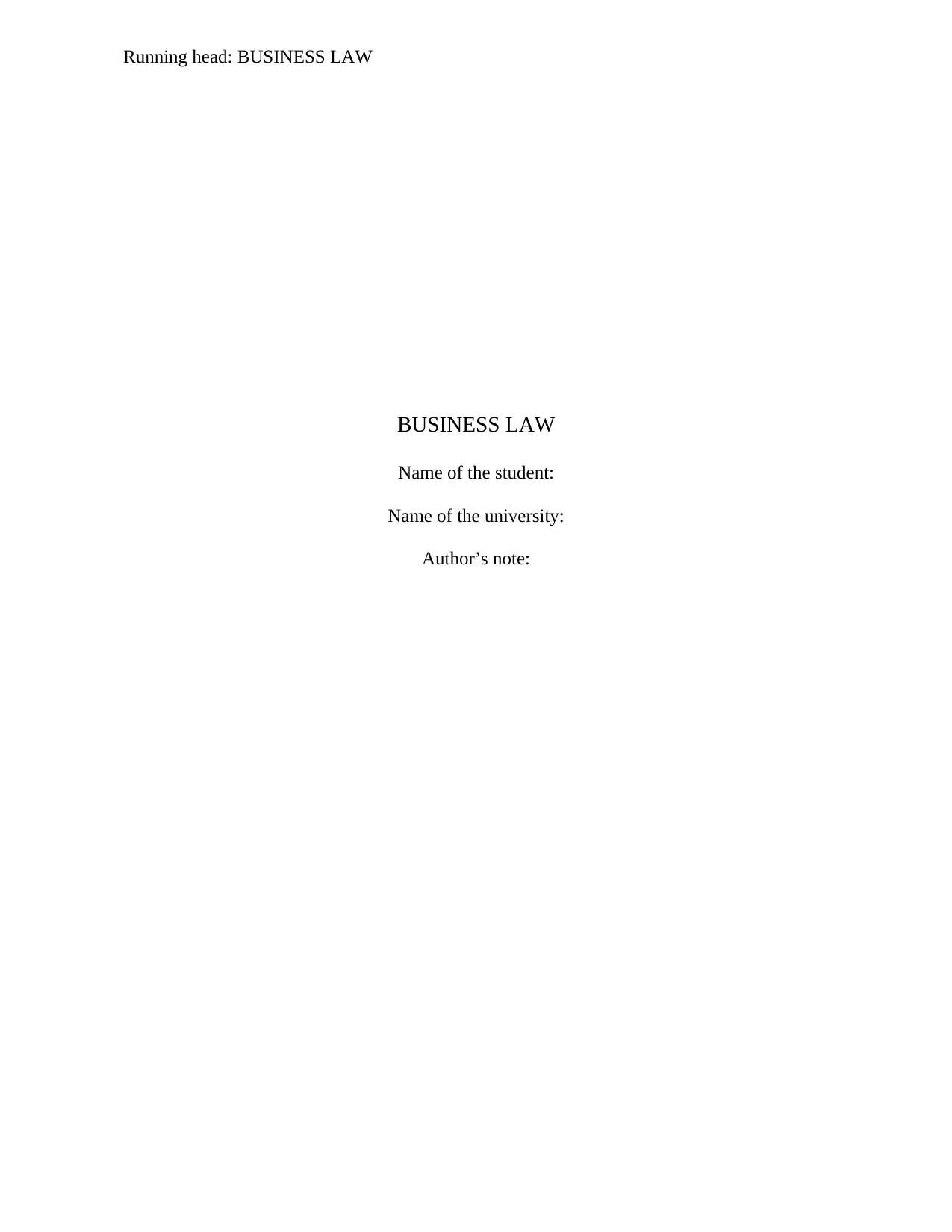
Running head: BUSINESS LAW
0
BUSINESS LAW
Name of the student:
Name of the university:
Author’s note:
0
BUSINESS LAW
Name of the student:
Name of the university:
Author’s note:
Secure Best Marks with AI Grader
Need help grading? Try our AI Grader for instant feedback on your assignments.
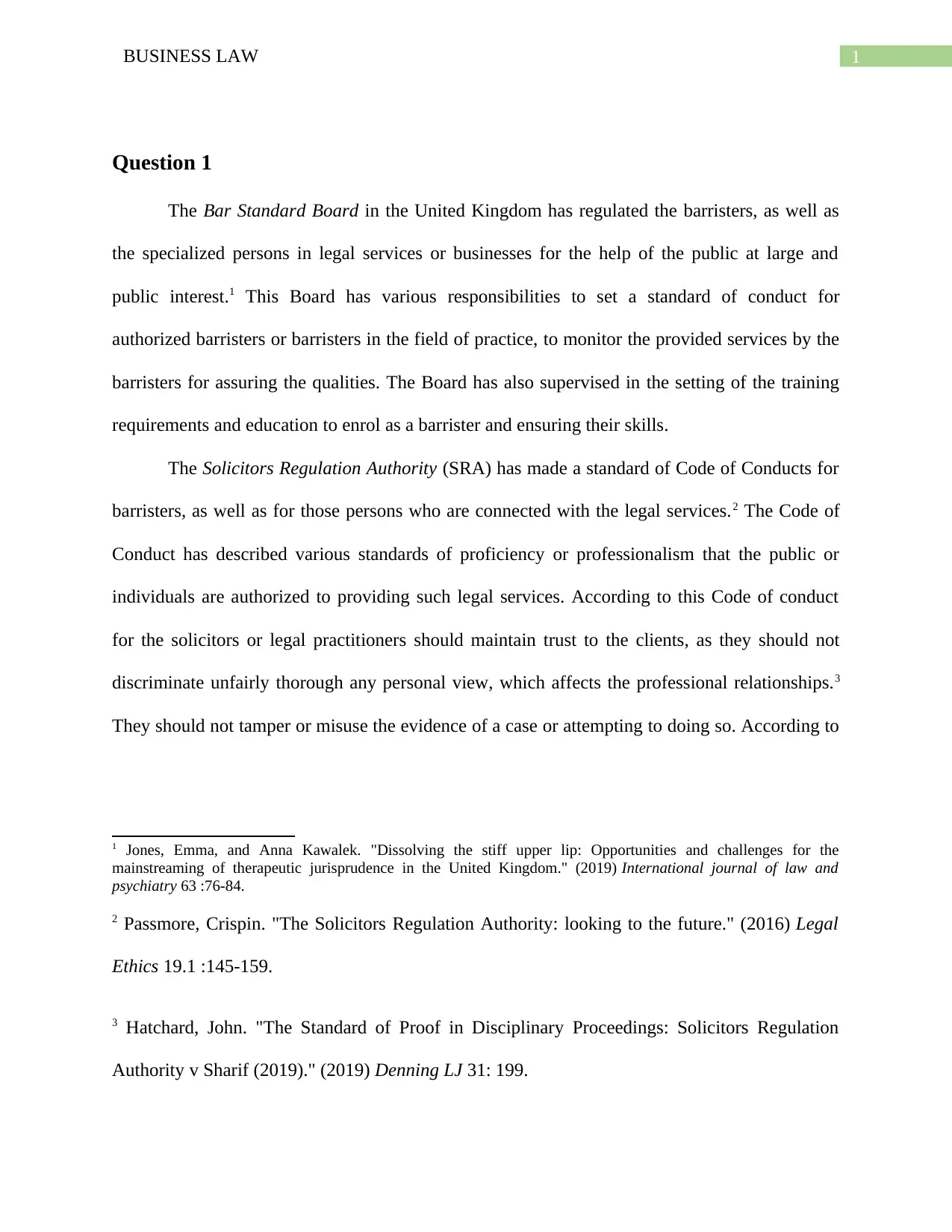
1BUSINESS LAW
Question 1
The Bar Standard Board in the United Kingdom has regulated the barristers, as well as
the specialized persons in legal services or businesses for the help of the public at large and
public interest.1 This Board has various responsibilities to set a standard of conduct for
authorized barristers or barristers in the field of practice, to monitor the provided services by the
barristers for assuring the qualities. The Board has also supervised in the setting of the training
requirements and education to enrol as a barrister and ensuring their skills.
The Solicitors Regulation Authority (SRA) has made a standard of Code of Conducts for
barristers, as well as for those persons who are connected with the legal services.2 The Code of
Conduct has described various standards of proficiency or professionalism that the public or
individuals are authorized to providing such legal services. According to this Code of conduct
for the solicitors or legal practitioners should maintain trust to the clients, as they should not
discriminate unfairly thorough any personal view, which affects the professional relationships.3
They should not tamper or misuse the evidence of a case or attempting to doing so. According to
1 Jones, Emma, and Anna Kawalek. "Dissolving the stiff upper lip: Opportunities and challenges for the
mainstreaming of therapeutic jurisprudence in the United Kingdom." (2019) International journal of law and
psychiatry 63 :76-84.
2 Passmore, Crispin. "The Solicitors Regulation Authority: looking to the future." (2016) Legal
Ethics 19.1 :145-159.
3 Hatchard, John. "The Standard of Proof in Disciplinary Proceedings: Solicitors Regulation
Authority v Sharif (2019)." (2019) Denning LJ 31: 199.
Question 1
The Bar Standard Board in the United Kingdom has regulated the barristers, as well as
the specialized persons in legal services or businesses for the help of the public at large and
public interest.1 This Board has various responsibilities to set a standard of conduct for
authorized barristers or barristers in the field of practice, to monitor the provided services by the
barristers for assuring the qualities. The Board has also supervised in the setting of the training
requirements and education to enrol as a barrister and ensuring their skills.
The Solicitors Regulation Authority (SRA) has made a standard of Code of Conducts for
barristers, as well as for those persons who are connected with the legal services.2 The Code of
Conduct has described various standards of proficiency or professionalism that the public or
individuals are authorized to providing such legal services. According to this Code of conduct
for the solicitors or legal practitioners should maintain trust to the clients, as they should not
discriminate unfairly thorough any personal view, which affects the professional relationships.3
They should not tamper or misuse the evidence of a case or attempting to doing so. According to
1 Jones, Emma, and Anna Kawalek. "Dissolving the stiff upper lip: Opportunities and challenges for the
mainstreaming of therapeutic jurisprudence in the United Kingdom." (2019) International journal of law and
psychiatry 63 :76-84.
2 Passmore, Crispin. "The Solicitors Regulation Authority: looking to the future." (2016) Legal
Ethics 19.1 :145-159.
3 Hatchard, John. "The Standard of Proof in Disciplinary Proceedings: Solicitors Regulation
Authority v Sharif (2019)." (2019) Denning LJ 31: 199.
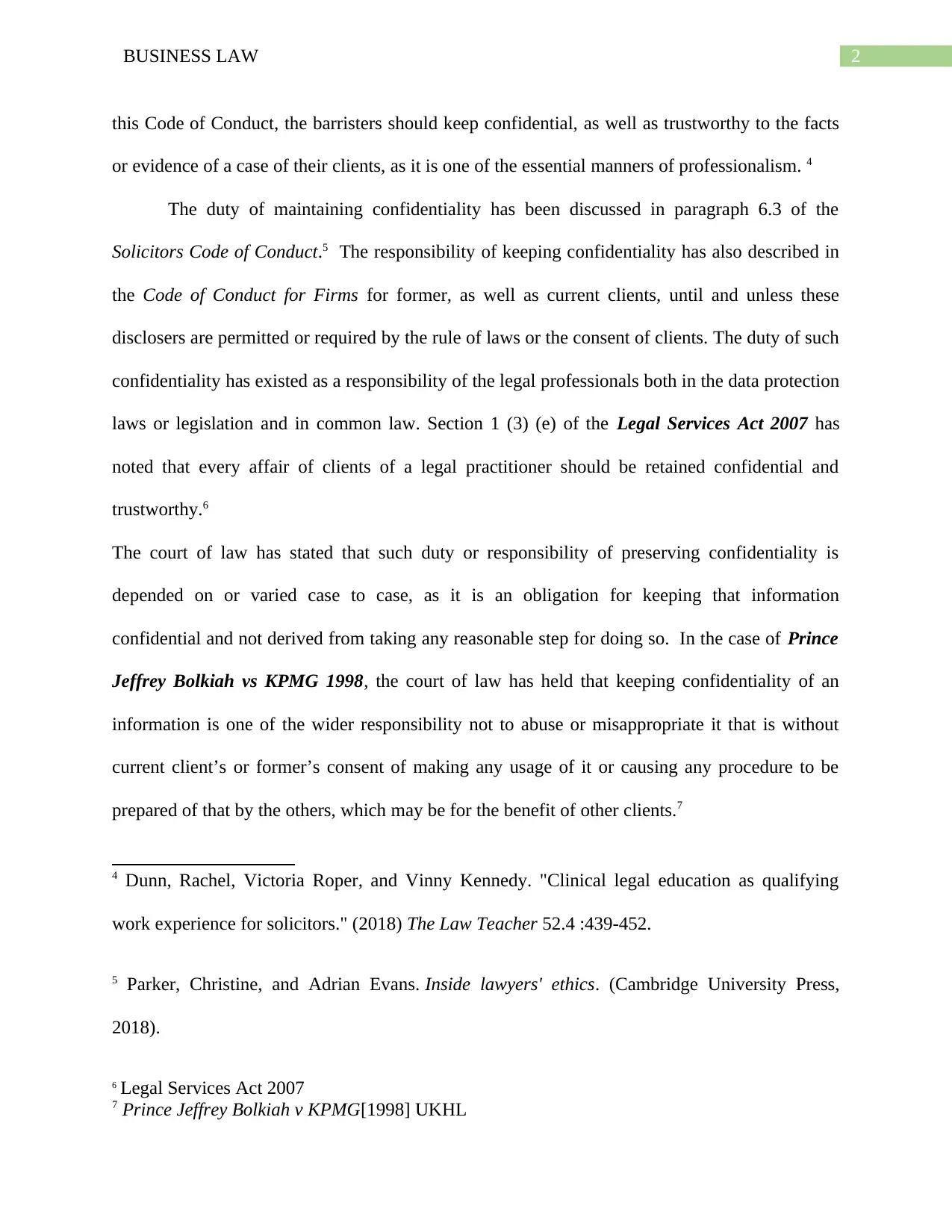
2BUSINESS LAW
this Code of Conduct, the barristers should keep confidential, as well as trustworthy to the facts
or evidence of a case of their clients, as it is one of the essential manners of professionalism. 4
The duty of maintaining confidentiality has been discussed in paragraph 6.3 of the
Solicitors Code of Conduct.5 The responsibility of keeping confidentiality has also described in
the Code of Conduct for Firms for former, as well as current clients, until and unless these
disclosers are permitted or required by the rule of laws or the consent of clients. The duty of such
confidentiality has existed as a responsibility of the legal professionals both in the data protection
laws or legislation and in common law. Section 1 (3) (e) of the Legal Services Act 2007 has
noted that every affair of clients of a legal practitioner should be retained confidential and
trustworthy.6
The court of law has stated that such duty or responsibility of preserving confidentiality is
depended on or varied case to case, as it is an obligation for keeping that information
confidential and not derived from taking any reasonable step for doing so. In the case of Prince
Jeffrey Bolkiah vs KPMG 1998, the court of law has held that keeping confidentiality of an
information is one of the wider responsibility not to abuse or misappropriate it that is without
current client’s or former’s consent of making any usage of it or causing any procedure to be
prepared of that by the others, which may be for the benefit of other clients.7
4 Dunn, Rachel, Victoria Roper, and Vinny Kennedy. "Clinical legal education as qualifying
work experience for solicitors." (2018) The Law Teacher 52.4 :439-452.
5 Parker, Christine, and Adrian Evans. Inside lawyers' ethics. (Cambridge University Press,
2018).
6 Legal Services Act 2007
7 Prince Jeffrey Bolkiah v KPMG[1998] UKHL
this Code of Conduct, the barristers should keep confidential, as well as trustworthy to the facts
or evidence of a case of their clients, as it is one of the essential manners of professionalism. 4
The duty of maintaining confidentiality has been discussed in paragraph 6.3 of the
Solicitors Code of Conduct.5 The responsibility of keeping confidentiality has also described in
the Code of Conduct for Firms for former, as well as current clients, until and unless these
disclosers are permitted or required by the rule of laws or the consent of clients. The duty of such
confidentiality has existed as a responsibility of the legal professionals both in the data protection
laws or legislation and in common law. Section 1 (3) (e) of the Legal Services Act 2007 has
noted that every affair of clients of a legal practitioner should be retained confidential and
trustworthy.6
The court of law has stated that such duty or responsibility of preserving confidentiality is
depended on or varied case to case, as it is an obligation for keeping that information
confidential and not derived from taking any reasonable step for doing so. In the case of Prince
Jeffrey Bolkiah vs KPMG 1998, the court of law has held that keeping confidentiality of an
information is one of the wider responsibility not to abuse or misappropriate it that is without
current client’s or former’s consent of making any usage of it or causing any procedure to be
prepared of that by the others, which may be for the benefit of other clients.7
4 Dunn, Rachel, Victoria Roper, and Vinny Kennedy. "Clinical legal education as qualifying
work experience for solicitors." (2018) The Law Teacher 52.4 :439-452.
5 Parker, Christine, and Adrian Evans. Inside lawyers' ethics. (Cambridge University Press,
2018).
6 Legal Services Act 2007
7 Prince Jeffrey Bolkiah v KPMG[1998] UKHL
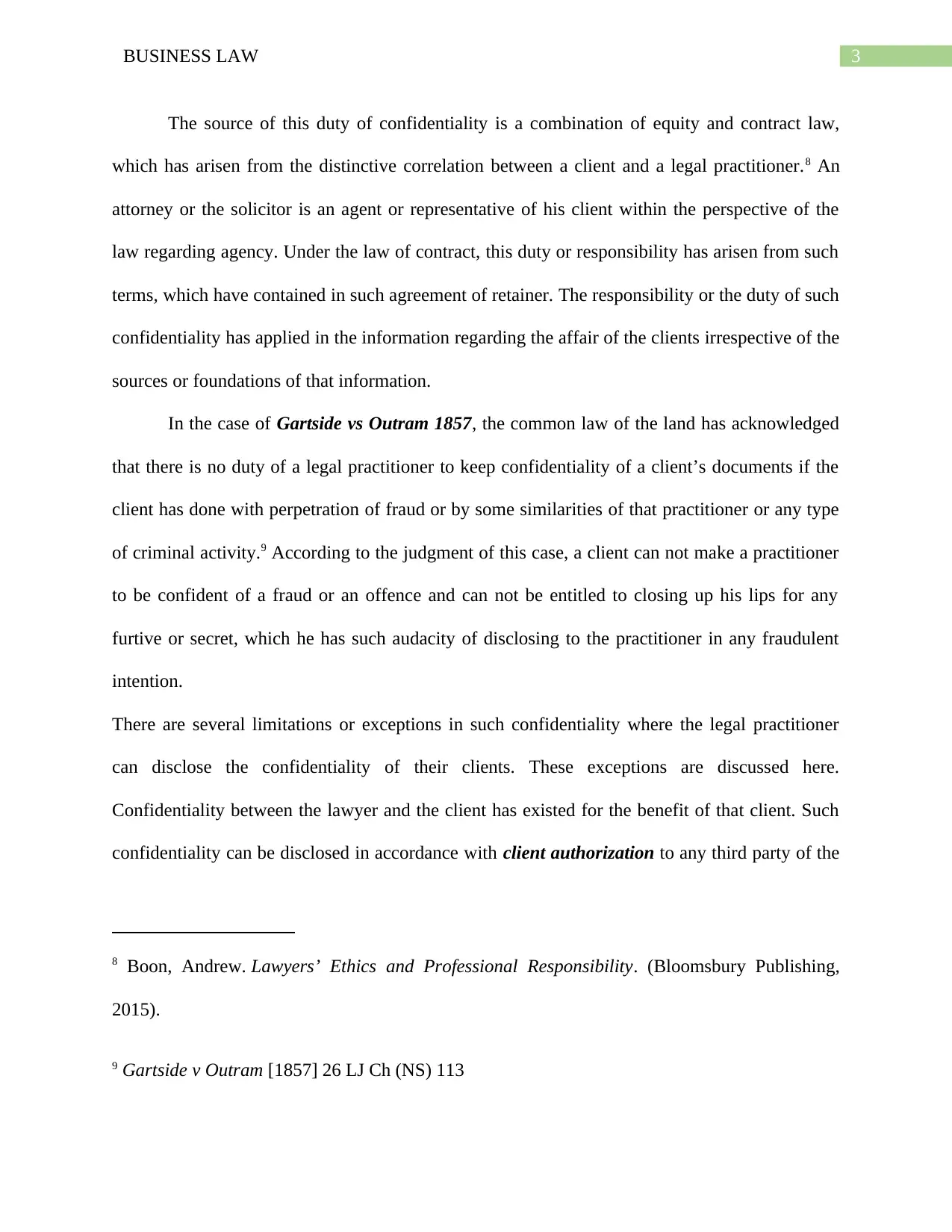
3BUSINESS LAW
The source of this duty of confidentiality is a combination of equity and contract law,
which has arisen from the distinctive correlation between a client and a legal practitioner.8 An
attorney or the solicitor is an agent or representative of his client within the perspective of the
law regarding agency. Under the law of contract, this duty or responsibility has arisen from such
terms, which have contained in such agreement of retainer. The responsibility or the duty of such
confidentiality has applied in the information regarding the affair of the clients irrespective of the
sources or foundations of that information.
In the case of Gartside vs Outram 1857, the common law of the land has acknowledged
that there is no duty of a legal practitioner to keep confidentiality of a client’s documents if the
client has done with perpetration of fraud or by some similarities of that practitioner or any type
of criminal activity.9 According to the judgment of this case, a client can not make a practitioner
to be confident of a fraud or an offence and can not be entitled to closing up his lips for any
furtive or secret, which he has such audacity of disclosing to the practitioner in any fraudulent
intention.
There are several limitations or exceptions in such confidentiality where the legal practitioner
can disclose the confidentiality of their clients. These exceptions are discussed here.
Confidentiality between the lawyer and the client has existed for the benefit of that client. Such
confidentiality can be disclosed in accordance with client authorization to any third party of the
8 Boon, Andrew. Lawyers’ Ethics and Professional Responsibility. (Bloomsbury Publishing,
2015).
9 Gartside v Outram [1857] 26 LJ Ch (NS) 113
The source of this duty of confidentiality is a combination of equity and contract law,
which has arisen from the distinctive correlation between a client and a legal practitioner.8 An
attorney or the solicitor is an agent or representative of his client within the perspective of the
law regarding agency. Under the law of contract, this duty or responsibility has arisen from such
terms, which have contained in such agreement of retainer. The responsibility or the duty of such
confidentiality has applied in the information regarding the affair of the clients irrespective of the
sources or foundations of that information.
In the case of Gartside vs Outram 1857, the common law of the land has acknowledged
that there is no duty of a legal practitioner to keep confidentiality of a client’s documents if the
client has done with perpetration of fraud or by some similarities of that practitioner or any type
of criminal activity.9 According to the judgment of this case, a client can not make a practitioner
to be confident of a fraud or an offence and can not be entitled to closing up his lips for any
furtive or secret, which he has such audacity of disclosing to the practitioner in any fraudulent
intention.
There are several limitations or exceptions in such confidentiality where the legal practitioner
can disclose the confidentiality of their clients. These exceptions are discussed here.
Confidentiality between the lawyer and the client has existed for the benefit of that client. Such
confidentiality can be disclosed in accordance with client authorization to any third party of the
8 Boon, Andrew. Lawyers’ Ethics and Professional Responsibility. (Bloomsbury Publishing,
2015).
9 Gartside v Outram [1857] 26 LJ Ch (NS) 113
Secure Best Marks with AI Grader
Need help grading? Try our AI Grader for instant feedback on your assignments.
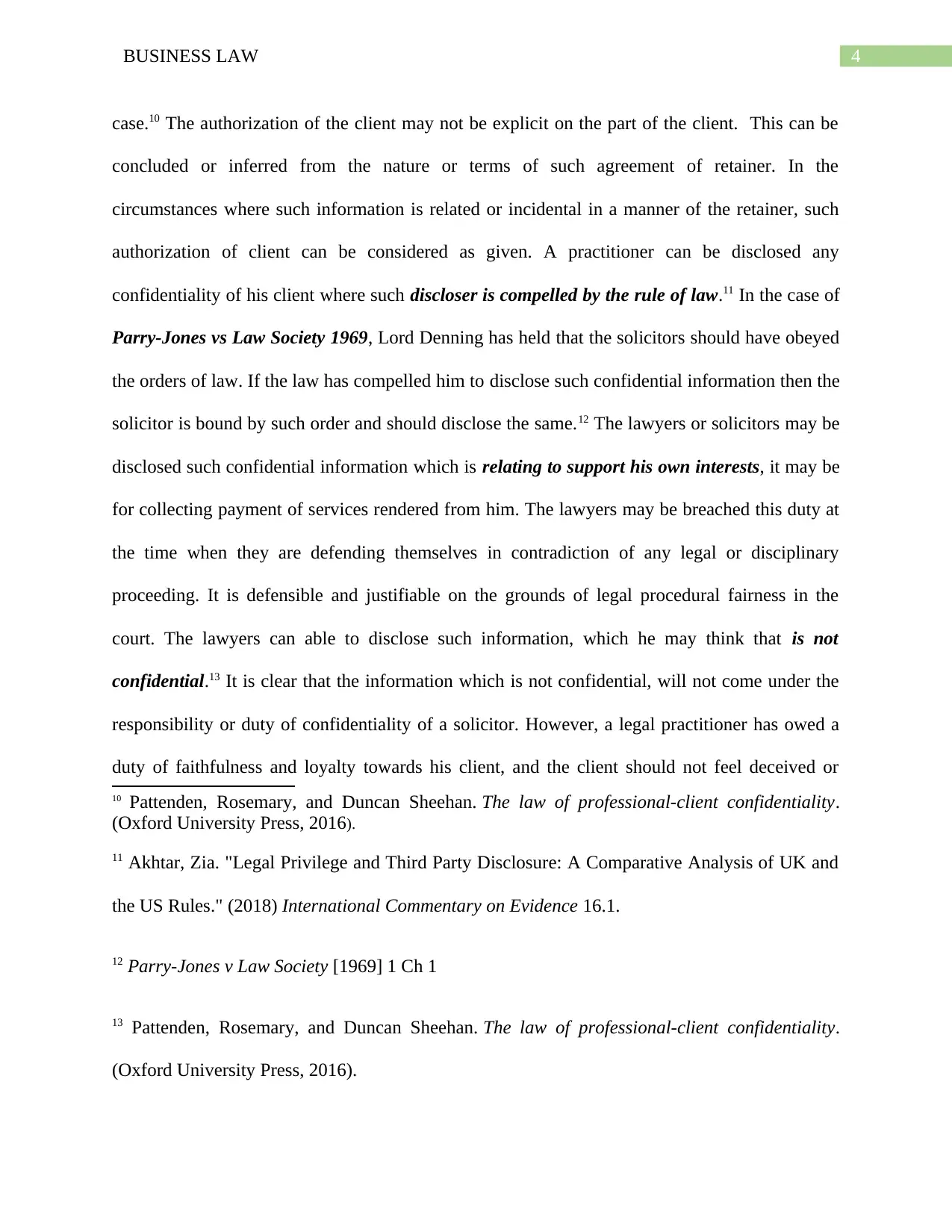
4BUSINESS LAW
case.10 The authorization of the client may not be explicit on the part of the client. This can be
concluded or inferred from the nature or terms of such agreement of retainer. In the
circumstances where such information is related or incidental in a manner of the retainer, such
authorization of client can be considered as given. A practitioner can be disclosed any
confidentiality of his client where such discloser is compelled by the rule of law.11 In the case of
Parry-Jones vs Law Society 1969, Lord Denning has held that the solicitors should have obeyed
the orders of law. If the law has compelled him to disclose such confidential information then the
solicitor is bound by such order and should disclose the same.12 The lawyers or solicitors may be
disclosed such confidential information which is relating to support his own interests, it may be
for collecting payment of services rendered from him. The lawyers may be breached this duty at
the time when they are defending themselves in contradiction of any legal or disciplinary
proceeding. It is defensible and justifiable on the grounds of legal procedural fairness in the
court. The lawyers can able to disclose such information, which he may think that is not
confidential.13 It is clear that the information which is not confidential, will not come under the
responsibility or duty of confidentiality of a solicitor. However, a legal practitioner has owed a
duty of faithfulness and loyalty towards his client, and the client should not feel deceived or
10 Pattenden, Rosemary, and Duncan Sheehan. The law of professional-client confidentiality.
(Oxford University Press, 2016).
11 Akhtar, Zia. "Legal Privilege and Third Party Disclosure: A Comparative Analysis of UK and
the US Rules." (2018) International Commentary on Evidence 16.1.
12 Parry-Jones v Law Society [1969] 1 Ch 1
13 Pattenden, Rosemary, and Duncan Sheehan. The law of professional-client confidentiality.
(Oxford University Press, 2016).
case.10 The authorization of the client may not be explicit on the part of the client. This can be
concluded or inferred from the nature or terms of such agreement of retainer. In the
circumstances where such information is related or incidental in a manner of the retainer, such
authorization of client can be considered as given. A practitioner can be disclosed any
confidentiality of his client where such discloser is compelled by the rule of law.11 In the case of
Parry-Jones vs Law Society 1969, Lord Denning has held that the solicitors should have obeyed
the orders of law. If the law has compelled him to disclose such confidential information then the
solicitor is bound by such order and should disclose the same.12 The lawyers or solicitors may be
disclosed such confidential information which is relating to support his own interests, it may be
for collecting payment of services rendered from him. The lawyers may be breached this duty at
the time when they are defending themselves in contradiction of any legal or disciplinary
proceeding. It is defensible and justifiable on the grounds of legal procedural fairness in the
court. The lawyers can able to disclose such information, which he may think that is not
confidential.13 It is clear that the information which is not confidential, will not come under the
responsibility or duty of confidentiality of a solicitor. However, a legal practitioner has owed a
duty of faithfulness and loyalty towards his client, and the client should not feel deceived or
10 Pattenden, Rosemary, and Duncan Sheehan. The law of professional-client confidentiality.
(Oxford University Press, 2016).
11 Akhtar, Zia. "Legal Privilege and Third Party Disclosure: A Comparative Analysis of UK and
the US Rules." (2018) International Commentary on Evidence 16.1.
12 Parry-Jones v Law Society [1969] 1 Ch 1
13 Pattenden, Rosemary, and Duncan Sheehan. The law of professional-client confidentiality.
(Oxford University Press, 2016).
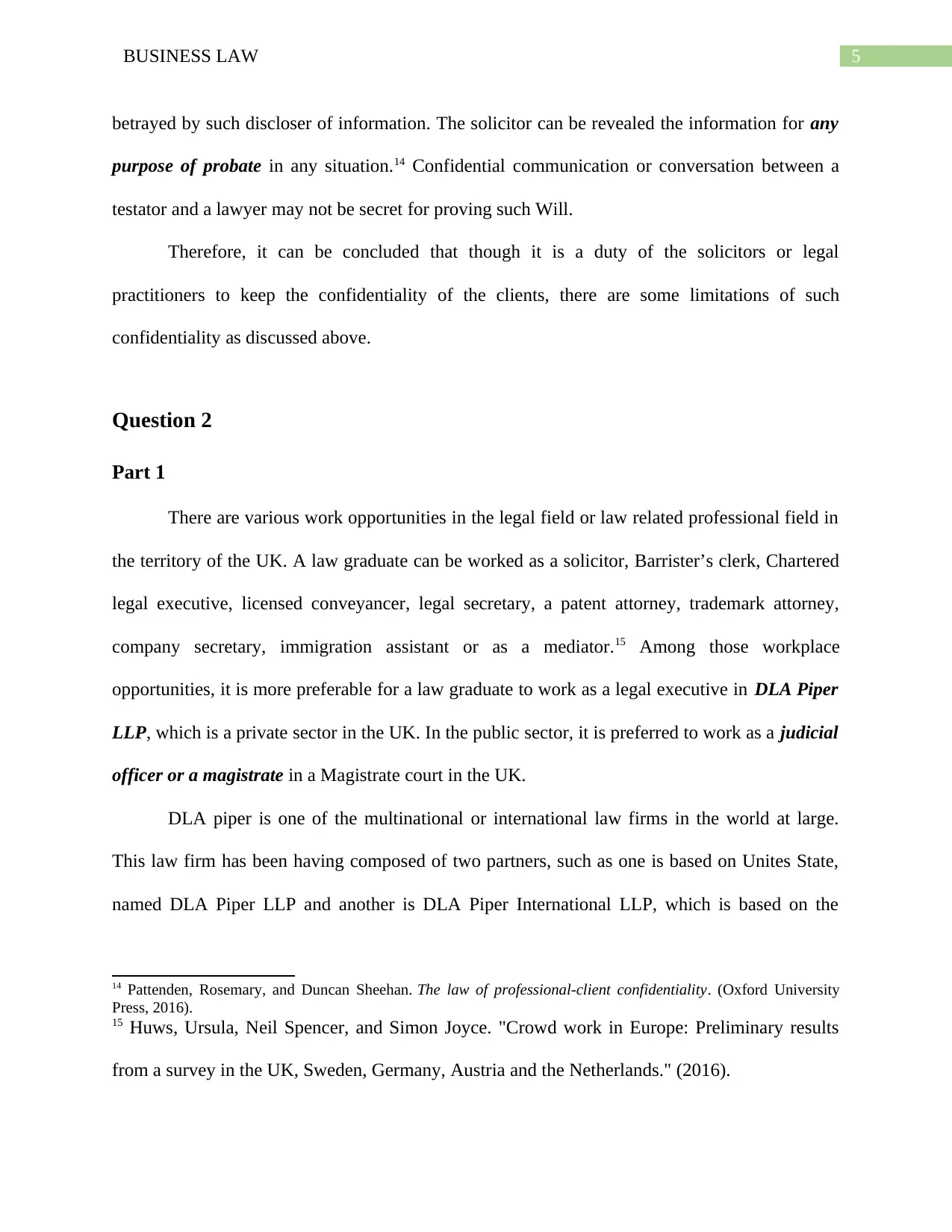
5BUSINESS LAW
betrayed by such discloser of information. The solicitor can be revealed the information for any
purpose of probate in any situation.14 Confidential communication or conversation between a
testator and a lawyer may not be secret for proving such Will.
Therefore, it can be concluded that though it is a duty of the solicitors or legal
practitioners to keep the confidentiality of the clients, there are some limitations of such
confidentiality as discussed above.
Question 2
Part 1
There are various work opportunities in the legal field or law related professional field in
the territory of the UK. A law graduate can be worked as a solicitor, Barrister’s clerk, Chartered
legal executive, licensed conveyancer, legal secretary, a patent attorney, trademark attorney,
company secretary, immigration assistant or as a mediator.15 Among those workplace
opportunities, it is more preferable for a law graduate to work as a legal executive in DLA Piper
LLP, which is a private sector in the UK. In the public sector, it is preferred to work as a judicial
officer or a magistrate in a Magistrate court in the UK.
DLA piper is one of the multinational or international law firms in the world at large.
This law firm has been having composed of two partners, such as one is based on Unites State,
named DLA Piper LLP and another is DLA Piper International LLP, which is based on the
14 Pattenden, Rosemary, and Duncan Sheehan. The law of professional-client confidentiality. (Oxford University
Press, 2016).
15 Huws, Ursula, Neil Spencer, and Simon Joyce. "Crowd work in Europe: Preliminary results
from a survey in the UK, Sweden, Germany, Austria and the Netherlands." (2016).
betrayed by such discloser of information. The solicitor can be revealed the information for any
purpose of probate in any situation.14 Confidential communication or conversation between a
testator and a lawyer may not be secret for proving such Will.
Therefore, it can be concluded that though it is a duty of the solicitors or legal
practitioners to keep the confidentiality of the clients, there are some limitations of such
confidentiality as discussed above.
Question 2
Part 1
There are various work opportunities in the legal field or law related professional field in
the territory of the UK. A law graduate can be worked as a solicitor, Barrister’s clerk, Chartered
legal executive, licensed conveyancer, legal secretary, a patent attorney, trademark attorney,
company secretary, immigration assistant or as a mediator.15 Among those workplace
opportunities, it is more preferable for a law graduate to work as a legal executive in DLA Piper
LLP, which is a private sector in the UK. In the public sector, it is preferred to work as a judicial
officer or a magistrate in a Magistrate court in the UK.
DLA piper is one of the multinational or international law firms in the world at large.
This law firm has been having composed of two partners, such as one is based on Unites State,
named DLA Piper LLP and another is DLA Piper International LLP, which is based on the
14 Pattenden, Rosemary, and Duncan Sheehan. The law of professional-client confidentiality. (Oxford University
Press, 2016).
15 Huws, Ursula, Neil Spencer, and Simon Joyce. "Crowd work in Europe: Preliminary results
from a survey in the UK, Sweden, Germany, Austria and the Netherlands." (2016).
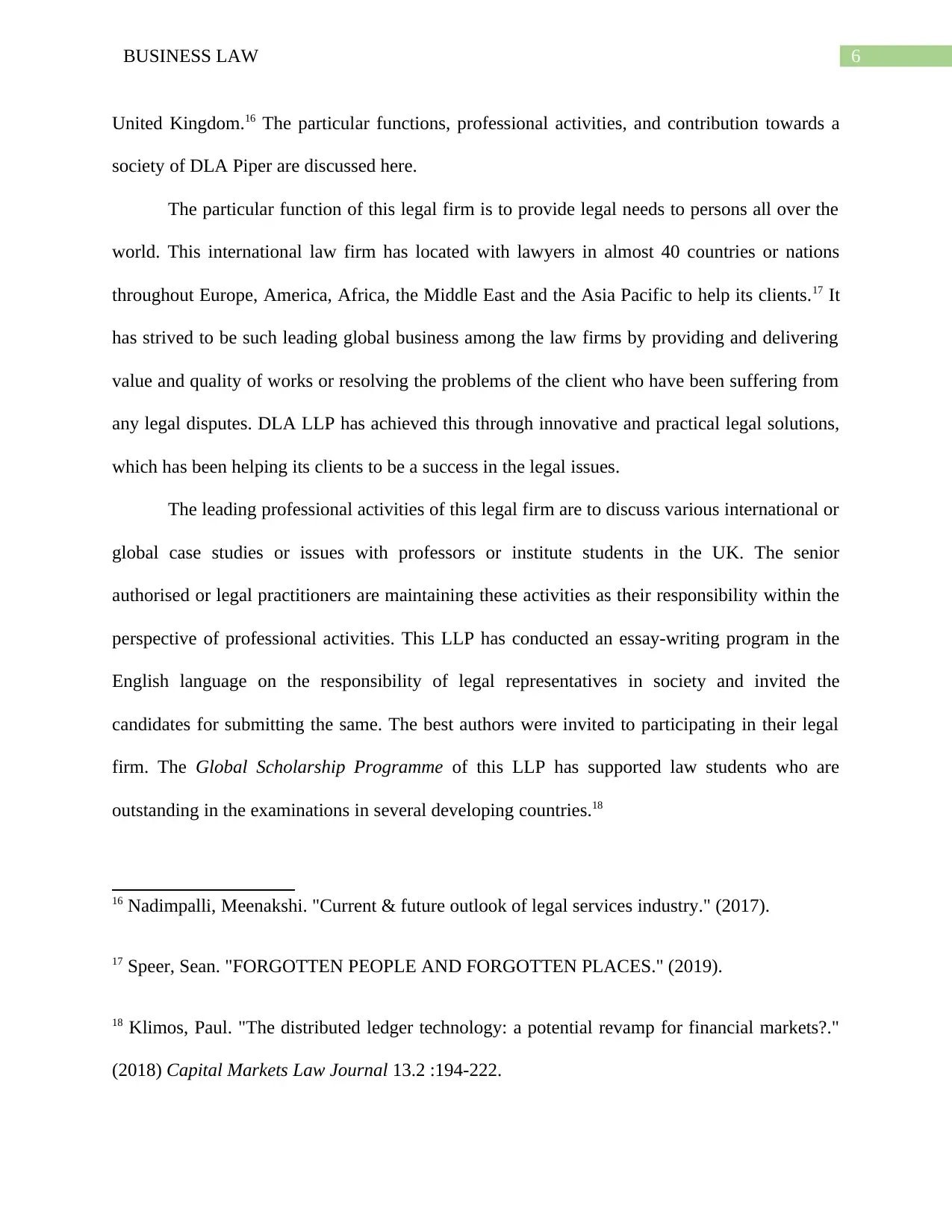
6BUSINESS LAW
United Kingdom.16 The particular functions, professional activities, and contribution towards a
society of DLA Piper are discussed here.
The particular function of this legal firm is to provide legal needs to persons all over the
world. This international law firm has located with lawyers in almost 40 countries or nations
throughout Europe, America, Africa, the Middle East and the Asia Pacific to help its clients.17 It
has strived to be such leading global business among the law firms by providing and delivering
value and quality of works or resolving the problems of the client who have been suffering from
any legal disputes. DLA LLP has achieved this through innovative and practical legal solutions,
which has been helping its clients to be a success in the legal issues.
The leading professional activities of this legal firm are to discuss various international or
global case studies or issues with professors or institute students in the UK. The senior
authorised or legal practitioners are maintaining these activities as their responsibility within the
perspective of professional activities. This LLP has conducted an essay-writing program in the
English language on the responsibility of legal representatives in society and invited the
candidates for submitting the same. The best authors were invited to participating in their legal
firm. The Global Scholarship Programme of this LLP has supported law students who are
outstanding in the examinations in several developing countries.18
16 Nadimpalli, Meenakshi. "Current & future outlook of legal services industry." (2017).
17 Speer, Sean. "FORGOTTEN PEOPLE AND FORGOTTEN PLACES." (2019).
18 Klimos, Paul. "The distributed ledger technology: a potential revamp for financial markets?."
(2018) Capital Markets Law Journal 13.2 :194-222.
United Kingdom.16 The particular functions, professional activities, and contribution towards a
society of DLA Piper are discussed here.
The particular function of this legal firm is to provide legal needs to persons all over the
world. This international law firm has located with lawyers in almost 40 countries or nations
throughout Europe, America, Africa, the Middle East and the Asia Pacific to help its clients.17 It
has strived to be such leading global business among the law firms by providing and delivering
value and quality of works or resolving the problems of the client who have been suffering from
any legal disputes. DLA LLP has achieved this through innovative and practical legal solutions,
which has been helping its clients to be a success in the legal issues.
The leading professional activities of this legal firm are to discuss various international or
global case studies or issues with professors or institute students in the UK. The senior
authorised or legal practitioners are maintaining these activities as their responsibility within the
perspective of professional activities. This LLP has conducted an essay-writing program in the
English language on the responsibility of legal representatives in society and invited the
candidates for submitting the same. The best authors were invited to participating in their legal
firm. The Global Scholarship Programme of this LLP has supported law students who are
outstanding in the examinations in several developing countries.18
16 Nadimpalli, Meenakshi. "Current & future outlook of legal services industry." (2017).
17 Speer, Sean. "FORGOTTEN PEOPLE AND FORGOTTEN PLACES." (2019).
18 Klimos, Paul. "The distributed ledger technology: a potential revamp for financial markets?."
(2018) Capital Markets Law Journal 13.2 :194-222.
Paraphrase This Document
Need a fresh take? Get an instant paraphrase of this document with our AI Paraphraser
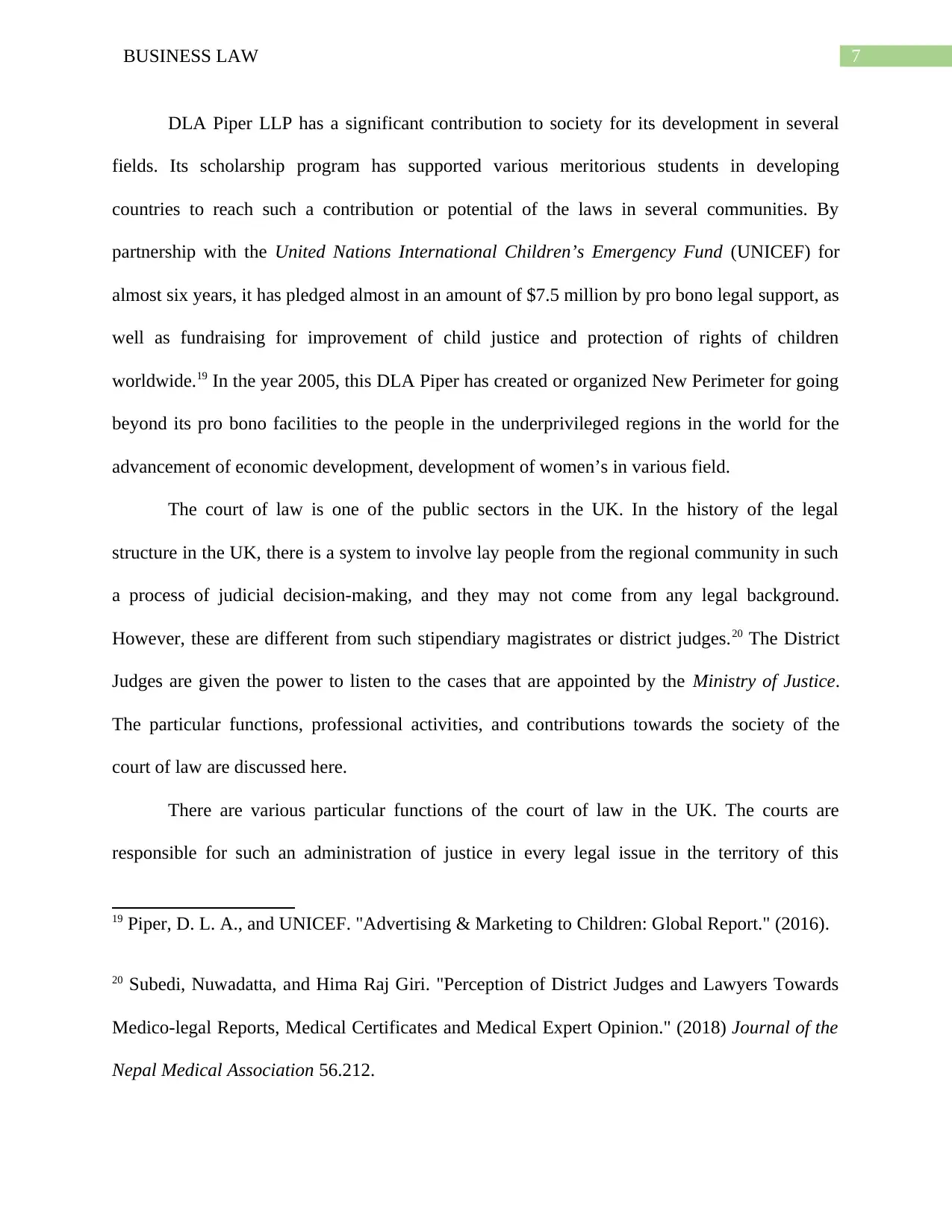
7BUSINESS LAW
DLA Piper LLP has a significant contribution to society for its development in several
fields. Its scholarship program has supported various meritorious students in developing
countries to reach such a contribution or potential of the laws in several communities. By
partnership with the United Nations International Children’s Emergency Fund (UNICEF) for
almost six years, it has pledged almost in an amount of $7.5 million by pro bono legal support, as
well as fundraising for improvement of child justice and protection of rights of children
worldwide.19 In the year 2005, this DLA Piper has created or organized New Perimeter for going
beyond its pro bono facilities to the people in the underprivileged regions in the world for the
advancement of economic development, development of women’s in various field.
The court of law is one of the public sectors in the UK. In the history of the legal
structure in the UK, there is a system to involve lay people from the regional community in such
a process of judicial decision-making, and they may not come from any legal background.
However, these are different from such stipendiary magistrates or district judges.20 The District
Judges are given the power to listen to the cases that are appointed by the Ministry of Justice.
The particular functions, professional activities, and contributions towards the society of the
court of law are discussed here.
There are various particular functions of the court of law in the UK. The courts are
responsible for such an administration of justice in every legal issue in the territory of this
19 Piper, D. L. A., and UNICEF. "Advertising & Marketing to Children: Global Report." (2016).
20 Subedi, Nuwadatta, and Hima Raj Giri. "Perception of District Judges and Lawyers Towards
Medico-legal Reports, Medical Certificates and Medical Expert Opinion." (2018) Journal of the
Nepal Medical Association 56.212.
DLA Piper LLP has a significant contribution to society for its development in several
fields. Its scholarship program has supported various meritorious students in developing
countries to reach such a contribution or potential of the laws in several communities. By
partnership with the United Nations International Children’s Emergency Fund (UNICEF) for
almost six years, it has pledged almost in an amount of $7.5 million by pro bono legal support, as
well as fundraising for improvement of child justice and protection of rights of children
worldwide.19 In the year 2005, this DLA Piper has created or organized New Perimeter for going
beyond its pro bono facilities to the people in the underprivileged regions in the world for the
advancement of economic development, development of women’s in various field.
The court of law is one of the public sectors in the UK. In the history of the legal
structure in the UK, there is a system to involve lay people from the regional community in such
a process of judicial decision-making, and they may not come from any legal background.
However, these are different from such stipendiary magistrates or district judges.20 The District
Judges are given the power to listen to the cases that are appointed by the Ministry of Justice.
The particular functions, professional activities, and contributions towards the society of the
court of law are discussed here.
There are various particular functions of the court of law in the UK. The courts are
responsible for such an administration of justice in every legal issue in the territory of this
19 Piper, D. L. A., and UNICEF. "Advertising & Marketing to Children: Global Report." (2016).
20 Subedi, Nuwadatta, and Hima Raj Giri. "Perception of District Judges and Lawyers Towards
Medico-legal Reports, Medical Certificates and Medical Expert Opinion." (2018) Journal of the
Nepal Medical Association 56.212.
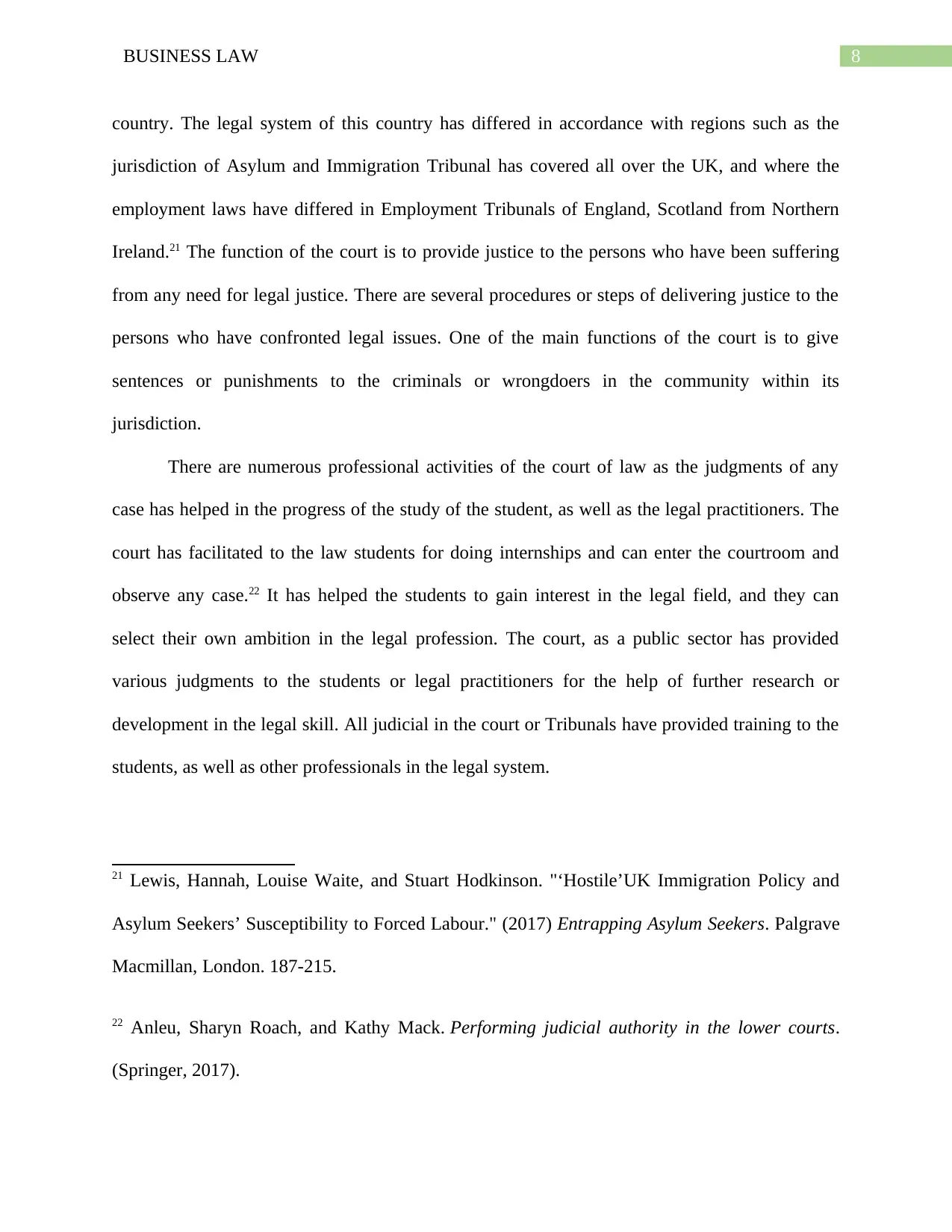
8BUSINESS LAW
country. The legal system of this country has differed in accordance with regions such as the
jurisdiction of Asylum and Immigration Tribunal has covered all over the UK, and where the
employment laws have differed in Employment Tribunals of England, Scotland from Northern
Ireland.21 The function of the court is to provide justice to the persons who have been suffering
from any need for legal justice. There are several procedures or steps of delivering justice to the
persons who have confronted legal issues. One of the main functions of the court is to give
sentences or punishments to the criminals or wrongdoers in the community within its
jurisdiction.
There are numerous professional activities of the court of law as the judgments of any
case has helped in the progress of the study of the student, as well as the legal practitioners. The
court has facilitated to the law students for doing internships and can enter the courtroom and
observe any case.22 It has helped the students to gain interest in the legal field, and they can
select their own ambition in the legal profession. The court, as a public sector has provided
various judgments to the students or legal practitioners for the help of further research or
development in the legal skill. All judicial in the court or Tribunals have provided training to the
students, as well as other professionals in the legal system.
21 Lewis, Hannah, Louise Waite, and Stuart Hodkinson. "‘Hostile’UK Immigration Policy and
Asylum Seekers’ Susceptibility to Forced Labour." (2017) Entrapping Asylum Seekers. Palgrave
Macmillan, London. 187-215.
22 Anleu, Sharyn Roach, and Kathy Mack. Performing judicial authority in the lower courts.
(Springer, 2017).
country. The legal system of this country has differed in accordance with regions such as the
jurisdiction of Asylum and Immigration Tribunal has covered all over the UK, and where the
employment laws have differed in Employment Tribunals of England, Scotland from Northern
Ireland.21 The function of the court is to provide justice to the persons who have been suffering
from any need for legal justice. There are several procedures or steps of delivering justice to the
persons who have confronted legal issues. One of the main functions of the court is to give
sentences or punishments to the criminals or wrongdoers in the community within its
jurisdiction.
There are numerous professional activities of the court of law as the judgments of any
case has helped in the progress of the study of the student, as well as the legal practitioners. The
court has facilitated to the law students for doing internships and can enter the courtroom and
observe any case.22 It has helped the students to gain interest in the legal field, and they can
select their own ambition in the legal profession. The court, as a public sector has provided
various judgments to the students or legal practitioners for the help of further research or
development in the legal skill. All judicial in the court or Tribunals have provided training to the
students, as well as other professionals in the legal system.
21 Lewis, Hannah, Louise Waite, and Stuart Hodkinson. "‘Hostile’UK Immigration Policy and
Asylum Seekers’ Susceptibility to Forced Labour." (2017) Entrapping Asylum Seekers. Palgrave
Macmillan, London. 187-215.
22 Anleu, Sharyn Roach, and Kathy Mack. Performing judicial authority in the lower courts.
(Springer, 2017).
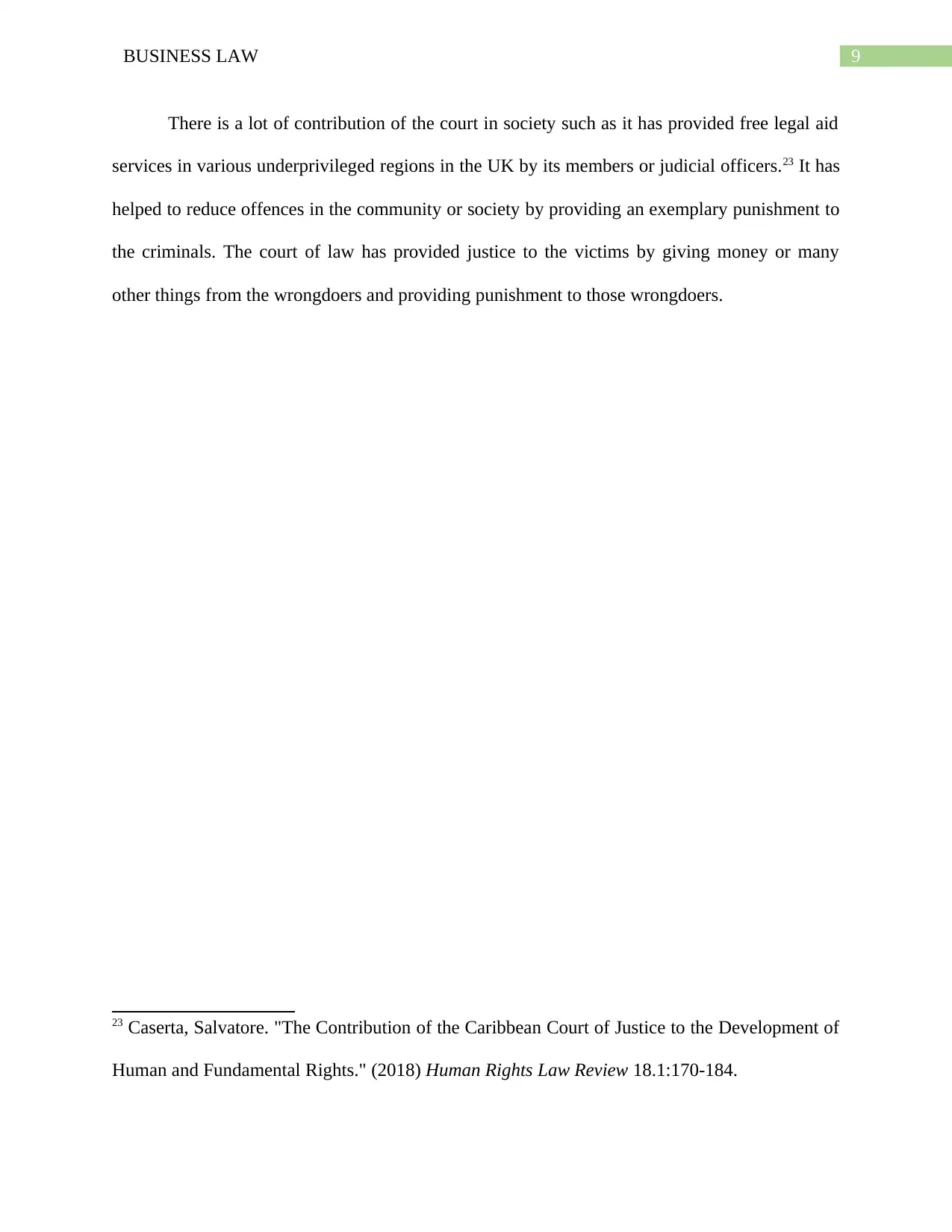
9BUSINESS LAW
There is a lot of contribution of the court in society such as it has provided free legal aid
services in various underprivileged regions in the UK by its members or judicial officers.23 It has
helped to reduce offences in the community or society by providing an exemplary punishment to
the criminals. The court of law has provided justice to the victims by giving money or many
other things from the wrongdoers and providing punishment to those wrongdoers.
23 Caserta, Salvatore. "The Contribution of the Caribbean Court of Justice to the Development of
Human and Fundamental Rights." (2018) Human Rights Law Review 18.1:170-184.
There is a lot of contribution of the court in society such as it has provided free legal aid
services in various underprivileged regions in the UK by its members or judicial officers.23 It has
helped to reduce offences in the community or society by providing an exemplary punishment to
the criminals. The court of law has provided justice to the victims by giving money or many
other things from the wrongdoers and providing punishment to those wrongdoers.
23 Caserta, Salvatore. "The Contribution of the Caribbean Court of Justice to the Development of
Human and Fundamental Rights." (2018) Human Rights Law Review 18.1:170-184.
Secure Best Marks with AI Grader
Need help grading? Try our AI Grader for instant feedback on your assignments.
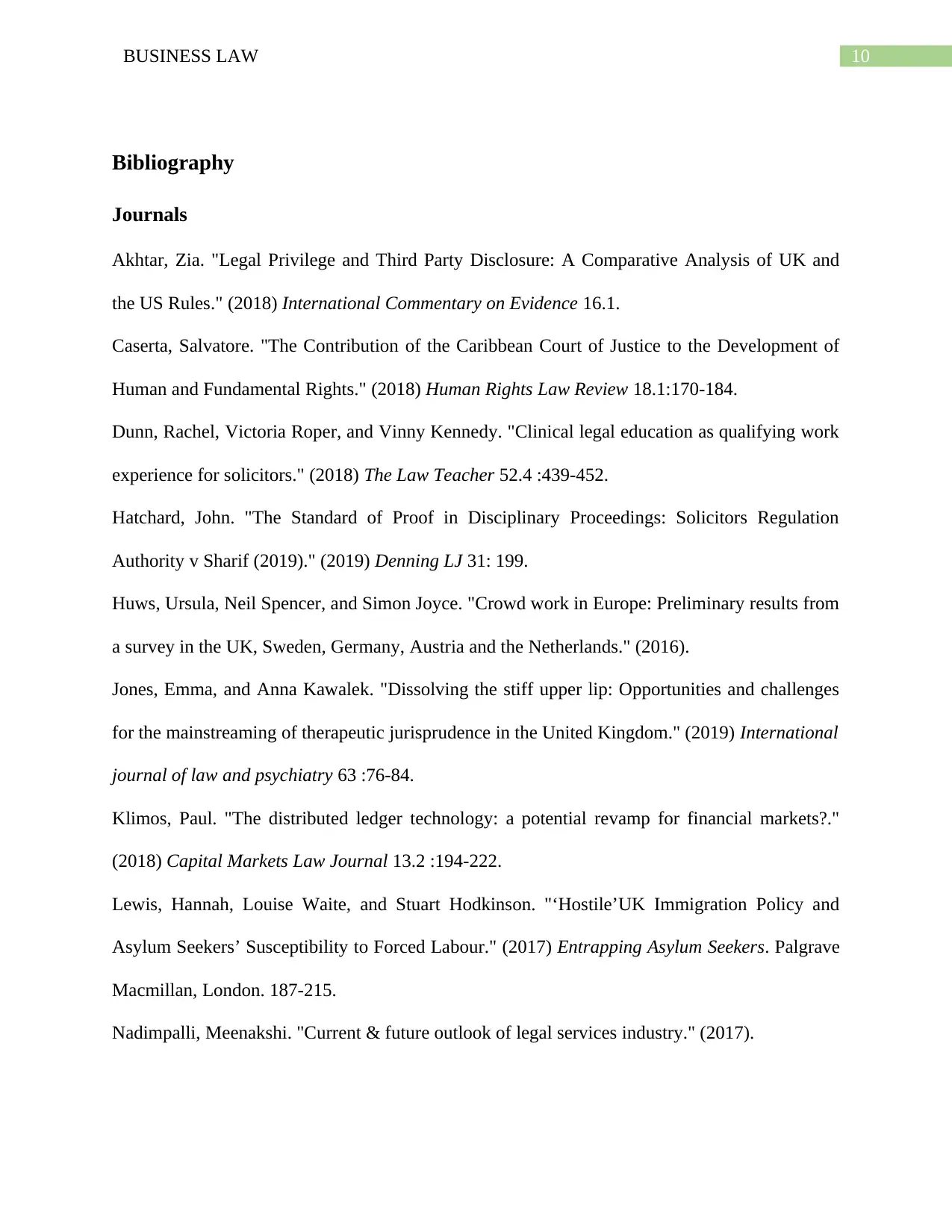
10BUSINESS LAW
Bibliography
Journals
Akhtar, Zia. "Legal Privilege and Third Party Disclosure: A Comparative Analysis of UK and
the US Rules." (2018) International Commentary on Evidence 16.1.
Caserta, Salvatore. "The Contribution of the Caribbean Court of Justice to the Development of
Human and Fundamental Rights." (2018) Human Rights Law Review 18.1:170-184.
Dunn, Rachel, Victoria Roper, and Vinny Kennedy. "Clinical legal education as qualifying work
experience for solicitors." (2018) The Law Teacher 52.4 :439-452.
Hatchard, John. "The Standard of Proof in Disciplinary Proceedings: Solicitors Regulation
Authority v Sharif (2019)." (2019) Denning LJ 31: 199.
Huws, Ursula, Neil Spencer, and Simon Joyce. "Crowd work in Europe: Preliminary results from
a survey in the UK, Sweden, Germany, Austria and the Netherlands." (2016).
Jones, Emma, and Anna Kawalek. "Dissolving the stiff upper lip: Opportunities and challenges
for the mainstreaming of therapeutic jurisprudence in the United Kingdom." (2019) International
journal of law and psychiatry 63 :76-84.
Klimos, Paul. "The distributed ledger technology: a potential revamp for financial markets?."
(2018) Capital Markets Law Journal 13.2 :194-222.
Lewis, Hannah, Louise Waite, and Stuart Hodkinson. "‘Hostile’UK Immigration Policy and
Asylum Seekers’ Susceptibility to Forced Labour." (2017) Entrapping Asylum Seekers. Palgrave
Macmillan, London. 187-215.
Nadimpalli, Meenakshi. "Current & future outlook of legal services industry." (2017).
Bibliography
Journals
Akhtar, Zia. "Legal Privilege and Third Party Disclosure: A Comparative Analysis of UK and
the US Rules." (2018) International Commentary on Evidence 16.1.
Caserta, Salvatore. "The Contribution of the Caribbean Court of Justice to the Development of
Human and Fundamental Rights." (2018) Human Rights Law Review 18.1:170-184.
Dunn, Rachel, Victoria Roper, and Vinny Kennedy. "Clinical legal education as qualifying work
experience for solicitors." (2018) The Law Teacher 52.4 :439-452.
Hatchard, John. "The Standard of Proof in Disciplinary Proceedings: Solicitors Regulation
Authority v Sharif (2019)." (2019) Denning LJ 31: 199.
Huws, Ursula, Neil Spencer, and Simon Joyce. "Crowd work in Europe: Preliminary results from
a survey in the UK, Sweden, Germany, Austria and the Netherlands." (2016).
Jones, Emma, and Anna Kawalek. "Dissolving the stiff upper lip: Opportunities and challenges
for the mainstreaming of therapeutic jurisprudence in the United Kingdom." (2019) International
journal of law and psychiatry 63 :76-84.
Klimos, Paul. "The distributed ledger technology: a potential revamp for financial markets?."
(2018) Capital Markets Law Journal 13.2 :194-222.
Lewis, Hannah, Louise Waite, and Stuart Hodkinson. "‘Hostile’UK Immigration Policy and
Asylum Seekers’ Susceptibility to Forced Labour." (2017) Entrapping Asylum Seekers. Palgrave
Macmillan, London. 187-215.
Nadimpalli, Meenakshi. "Current & future outlook of legal services industry." (2017).
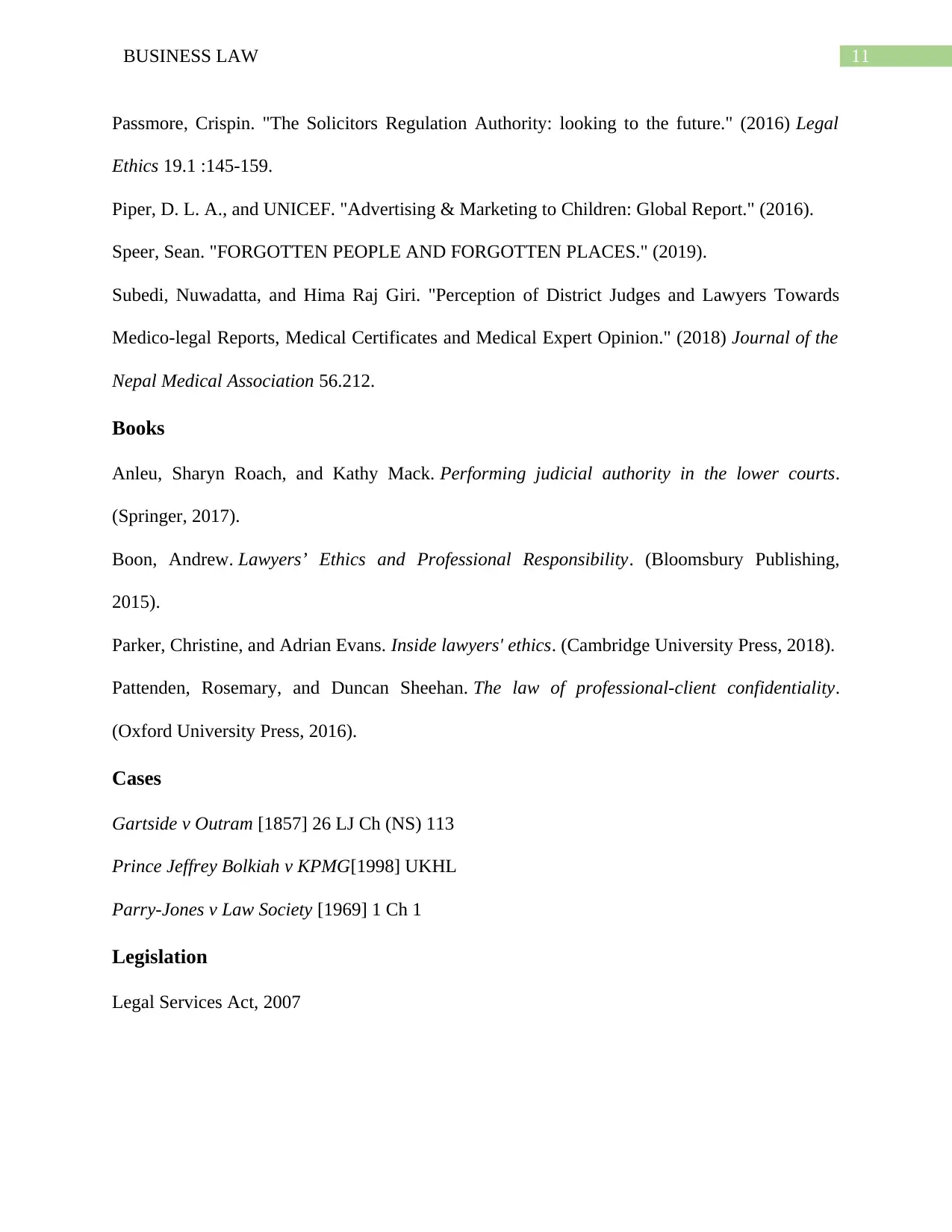
11BUSINESS LAW
Passmore, Crispin. "The Solicitors Regulation Authority: looking to the future." (2016) Legal
Ethics 19.1 :145-159.
Piper, D. L. A., and UNICEF. "Advertising & Marketing to Children: Global Report." (2016).
Speer, Sean. "FORGOTTEN PEOPLE AND FORGOTTEN PLACES." (2019).
Subedi, Nuwadatta, and Hima Raj Giri. "Perception of District Judges and Lawyers Towards
Medico-legal Reports, Medical Certificates and Medical Expert Opinion." (2018) Journal of the
Nepal Medical Association 56.212.
Books
Anleu, Sharyn Roach, and Kathy Mack. Performing judicial authority in the lower courts.
(Springer, 2017).
Boon, Andrew. Lawyers’ Ethics and Professional Responsibility. (Bloomsbury Publishing,
2015).
Parker, Christine, and Adrian Evans. Inside lawyers' ethics. (Cambridge University Press, 2018).
Pattenden, Rosemary, and Duncan Sheehan. The law of professional-client confidentiality.
(Oxford University Press, 2016).
Cases
Gartside v Outram [1857] 26 LJ Ch (NS) 113
Prince Jeffrey Bolkiah v KPMG[1998] UKHL
Parry-Jones v Law Society [1969] 1 Ch 1
Legislation
Legal Services Act, 2007
Passmore, Crispin. "The Solicitors Regulation Authority: looking to the future." (2016) Legal
Ethics 19.1 :145-159.
Piper, D. L. A., and UNICEF. "Advertising & Marketing to Children: Global Report." (2016).
Speer, Sean. "FORGOTTEN PEOPLE AND FORGOTTEN PLACES." (2019).
Subedi, Nuwadatta, and Hima Raj Giri. "Perception of District Judges and Lawyers Towards
Medico-legal Reports, Medical Certificates and Medical Expert Opinion." (2018) Journal of the
Nepal Medical Association 56.212.
Books
Anleu, Sharyn Roach, and Kathy Mack. Performing judicial authority in the lower courts.
(Springer, 2017).
Boon, Andrew. Lawyers’ Ethics and Professional Responsibility. (Bloomsbury Publishing,
2015).
Parker, Christine, and Adrian Evans. Inside lawyers' ethics. (Cambridge University Press, 2018).
Pattenden, Rosemary, and Duncan Sheehan. The law of professional-client confidentiality.
(Oxford University Press, 2016).
Cases
Gartside v Outram [1857] 26 LJ Ch (NS) 113
Prince Jeffrey Bolkiah v KPMG[1998] UKHL
Parry-Jones v Law Society [1969] 1 Ch 1
Legislation
Legal Services Act, 2007
1 out of 12
Related Documents
Your All-in-One AI-Powered Toolkit for Academic Success.
+13062052269
info@desklib.com
Available 24*7 on WhatsApp / Email
![[object Object]](/_next/static/media/star-bottom.7253800d.svg)
Unlock your academic potential
© 2024 | Zucol Services PVT LTD | All rights reserved.





